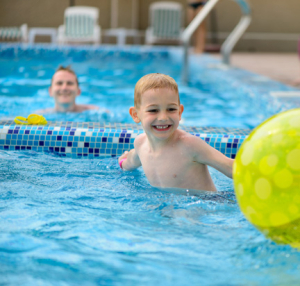 Summer issues a welcome invitation to water sports and fun, especially for children. There is no denying that kids love to swim and play in the water. While swimming and boating are enjoyable activities, they can also be dangerous. In fact, drowning is the number one cause of accidental deaths in children under the age of four, and the second cause in children 14 and under. For that reason, we’ve created a checklist with guidelines and tips to help parents make swimming and water fun as safe as possible for their children this summer.
Summer issues a welcome invitation to water sports and fun, especially for children. There is no denying that kids love to swim and play in the water. While swimming and boating are enjoyable activities, they can also be dangerous. In fact, drowning is the number one cause of accidental deaths in children under the age of four, and the second cause in children 14 and under. For that reason, we’ve created a checklist with guidelines and tips to help parents make swimming and water fun as safe as possible for their children this summer.
- Enroll children in swimming lessons. Children who know the basics of water safety and how to swim are less likely to drown. Enroll your child in swimming lessons to ensure their safety. Make sure your child is comfortable with the water–fear or nervousness can put a child at risk of accidents.
- Provide constant supervision to children in and around water. Whether your child is in or around a pool, the beach, or a bathtub, make sure they are watched closely. A lifeguard alone is not sufficient. Remember, a child can enter water quickly and find themselves in trouble before anyone is aware.
- Don’t let children swim alone. An adult or parent should always be in the water with a child, where they can see the child and quickly provide assistance, if necessary.
- Emphasize safety rules. Children simply do not understand the potential dangers of boating and swimming. If a child cannot swim, make sure they always wear a lifejacket or other approved swimming safety device. This is especially true when boating. Do not substitute inflatable water flotation devices, like inner tubes, floats, wings, or pool noodles. Also, teach your child boat safety rules and make sure they know the boundaries when swimming in lakes, rivers, and ponds.
- Create a water safety zone, wherever you are. If you are at a pool, make sure a child cannot easily access the pool. There should be fencing or barriers that prevent a child from entering the pool area, as well as gates that lock and open outward, not inward. Remove toys or other items that could enter a pool or surrounding area and tempt a child to retrieve them.
- Be a weather watcher. Water can quickly turn dangerous in a storm. Winds and lightning could cause dangerous currents or electrocution. At the first sign of an impending storm or change in tide, remove children from the water and seek shelter.
- Be prepared. Although we never want to think it could happen, accidents can happen. Make sure you are prepared in case of an emergency by having a First Aid kit, lifejackets, ropes or other devices to help a struggling swimmer, and a cell phone to call for assistance.
- Get trained in CPR. Cardiopulmonary resuscitation saves lives. Make sure one or more members of your family or group is trained in CPR and can administer it before help arrives.
- Monitor water play. Diving in low water and rough horse play can result in serious injury. Make sure children know what is and is not allowed and monitor their activities at all times.
- Don’t drink and swim. While swimming and boating are enjoyable and relaxing summer activities, avoid alcohol when around water. Not only does it affect one’s ability to swim and perceive danger, but it also affects the ability to respond in those who are responsible for monitoring and assisting should an emergency arise.
Prevention goes a long way toward ensuring the safety of both children and adults in the water. By being prepared, you can help your family avoid accidents or injuries, and everyone can be safe while they enjoy water fun in the sun.
